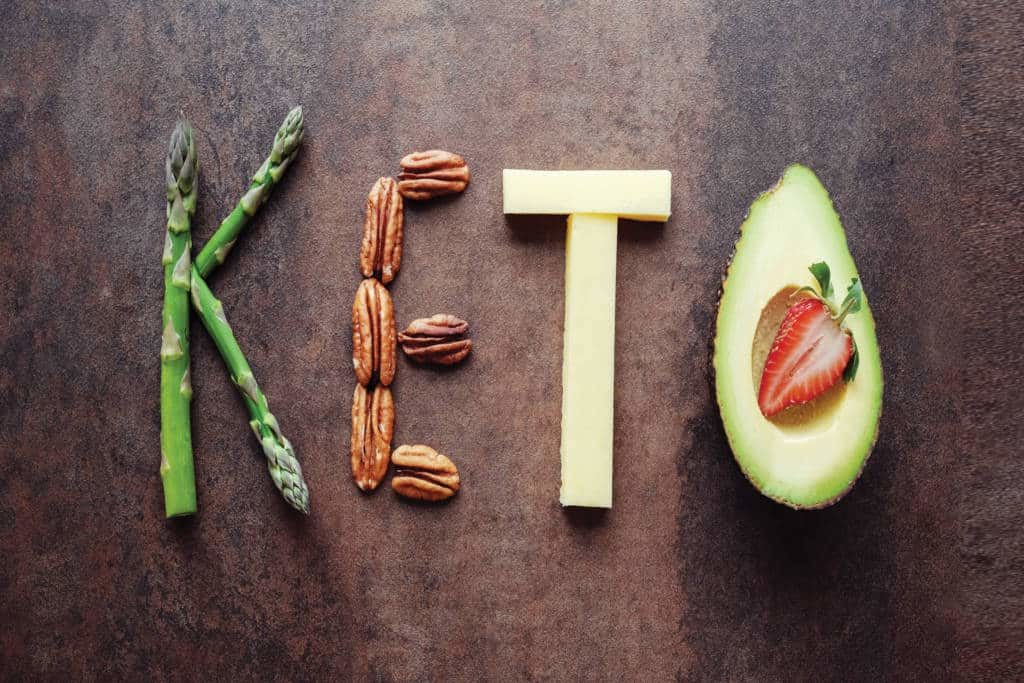“Keto is mainstream; after several years of popularity it is no longer questioned as a possible fad diet. Millions of people have found success in improving their health by following a cyclical keto lifestyle,” says Dr. Joseph Mercola, Founder of Mercola.com.
Successful followers report that the keto lifestyle can have a great impact on wellbeing, says David Perkins, CEO of Beetnik Foods. Shari Leidich, CEO of Know Brainer Foods, says keto has helped her throughout her journey with MS.
Odds are, consumers who come to your store looking for information have heard the positive reports and read up on the study-proven benefits (head to our website and search “keto” and “intermittent fasting” for the latest research and expert columns). That said, it’s important to also share the potential downsides, as well as advise consumers to consult their healthcare provider about any dietary or lifestyle change. The keto diet can cause digestive distress and “keto-flu” symptoms, which are common experiences of individuals adjusting to the high amount of healthy fats, Dr. Mercola explains.
It’s also important that dieters make sure they get enough essential vitamins and nutrients (3). And note that keto isn’t for everyone. Kevin McCray, Co-Founder of Kevin’s Natural Foods, explains, “Everyone is wired differently and needs to embrace what works for their lifestyle, medical condition, and fitness objectives. With that said, we are 100% convinced that most humans will benefit from decreasing their consumption of refined carbs.”
For those who do go keto, there are a ton of options to help them do it the healthy way. “People are recognizing that just because something is keto, doesn’t mean it’s healthy,” says Gael Orr, Marketing Communication and PR manager, Once Again Nut Butter. “With this in mind, consumers are shifting toward a ‘clean keto’ diet that prioritizes unprocessed, whole foods and high-quality, healthy sources of fats. Many people who follow the keto diet are looking to lose weight and reduce sluggishness by cutting out carbs, but what’s great about clean keto products specifically is that anyone can enjoy their health benefits. A diet of unprocessed, whole foods that aren’t full of refined sugars and carbohydrates is a win-win no matter what your dietary preferences are.”
What’s on the table? Whether it’s snacks, treats, breads, or broths, retailers have loads of options when it comes to stocking keto products.
Keto Inspiration
Jen Fisch adopted the ketogenic lifestyle to minimize inflammation and fight two autoimmune disorders. “Keto has made a major difference in my quality of life,” shares Fisch, who wrote the cookbook Keto In An Instant and also has a blog (socials @ketointhecity_ and www.ketointhecity.com). “I don’t think there is one way of eating that works for everyone, but this has really worked for me and is very sustainable for my lifestyle.”Along with improving her health, Fisch has found that Keto ignited her passion for cooking and finding creative ways to enjoy the flavors and dishes she’s always loved. The increase in popularity of the diet has made it a bit more convenient to follow the keto culture, too. “The keto and low-carb offerings have really exploded in the last few years, which is great from a convenience standpoint, but it also means you need to pay more attention as a consumer to ensure the product really is made from quality ingredients. I love that there are more fresh alternatives for traditionally high carb foods, like jicama tortillas and pre-spiralized zoodles, which are two things that I always have in my cart.”
As the term “keto” has become more well-known, it has also become less understood, she laments. “I hear a lot of people saying they are ‘keto this week’, or that they tried it for a few days. You need to drastically restrict carbs for at least a week, if not longer, to even enter into ketosis in the beginning. Even then you won’t become fat adapted for a month or more and that is when the healing benefits and weight loss benefits really start happening.” Fisch notes that retailers can help educate to make sure their customers understand what keto really is about and how different it is than simply eating a low-carb diet.
Quick & Easy Snacks
“Traditional snacks tend to be high in refined carbohydrates and added sugar,” says Bart Adlam, CEO, Chef’s Cut Real Jerky Co. When retailers are considering what snacks to stock, Adlam says they must 1) meet keto requirements, 2) satisfy cravings, and 3) exceed taste expectations. The most popular offerings from Chef’s Cut Real Jerky Co are their new Zero Sugar Meat Stick with high 8g protein, zero carbs, and 7g of fat; and their Beef Biltong, which has 26g of protein per bag, is naturally sugar-free, and made according to an authentic South African recipe.Coconut oil, cheese, avocado and cauliflower are key ingredients in popular Keto snacks, says Kevin Joseph, Chief Marketing Officer, ParmCrisps. Spicy flavorings, like sriracha, jalapeno and buffalo, are on trend. “When it comes to sweeter Keto offerings,” he says, “we see nut butters, chocolate chip and cinnamon making up the popular sweet flavor profiles.” The company also rolled out a new Keto Snack Mix, offering a 100% zero sugar, low carb trail mix that is high protein, vegetarian and oven-baked with Parmesan crisps, pistachios, almonds and cashews coated in premium seasonings.
One thing keto products have common, says Val Heuvel, Chief Innovation Officer, Smart Baking Company: “There’s an increasing shift toward natural and fresh—not surprising as people become more aware about their health and passionate about transparency.” The company is also seeing a trend towards grab-and-go keto options. “People are busy,” Heuvel says. “They want to stay on track, but they aren’t necessarily eating all of their meals at home.” Looking to provide convenient and healthy options, Smart Baking offers Smartmuf’ns for a quick breakfast, Smartcakes for a snack and Smartbuns as a good replacement to buns and conventional breads.
Another on-the-go snack pick: NOW’s best selling keto food products are their roasted & salted macadamia nuts and their zero calorie sweeteners, says Kristen Allen, Food Category Marketing Specialist, NOW Foods.
Also offering up nuts, LonoLife has mixed nuts snacks. “Not only do the nuts add texture to the keto diet, which is notorious for being monotonous where crunch is concerned, but they also add healthy fats and are low carb,” says Jesse Koltes, COO, LonoLife.
Bars are another quick and convenient keto option. Atlas Bars Peanut Butter Chocolate Chip and Chocolate Cacao flavor serve as a healthy on-the-go breakfast to accompany a morning coffee, says James Oliver, Founder/CEO, Atlas Bar.
Taking a sensitive-diet approach to snacking, Lilly’s Foods offers Keto-Cauliflower Hummus in original, golden milk, buffalo, and ranch dill flavors. The keto-friendly snack is also vegan, gluten-free, kosher certified and USDA organic.
For a keto-approved sip, Koia has introduced a plant-based shake with 5 grams of carbs and zero grams of sugar. And of course, coffee is a staple for many of those doing IF. Know Brainer offers a Mocha casein, low-carb option made with protein and healthy fat and lactose free, ketogenic creamer to sweeten up the first sip of the day.
Sweetening Things Up
Refined sugars are the worst enemy of the keto and IF culture, but brands have stepped up to solve the problem for the common sweet tooth. “We’re seeing a lot of interest in natural keto-friendly sweeteners,” says Kristen Allen of NOW. “In order to be keto, the sweetener should contain little to no sugar and/or carbs. Instead of going with artificial sweeteners, lots of keto enthusiasts are looking for natural and organic products, like stevia and monk fruit. What’s great about the keto diet is in order to be in ketosis, your sugar intake has to be very low and with sugar being a main ingredient in many processed foods, those following the keto diet tend to be eating cleaner, with less processed foods being a main part of their diet.”Convenient Mealtime Options
“Our aim is to help people solve dinner, where there are limited meal solutions at retail for people on a low net carbohydrate diet,” says McCray. “That’s why we make Keto-certified meals, recipe sauces, and seasonings to serve as clean culinary shortcuts to make it easier for today’s time-starved shopper to get a delicious dinner on the table that meets their nutrition standards.” A popular option at Kevin’s Natural Foods is a Keto-certified Thai-Style Coconut Chicken entrée, served over zucchini noodles, ready in 5-6 minutes.LonoLife offers another keto staple: bone broth. In March, the company launched a Keto Beef Bone Broth and Tomato Beef Bone Broth, which cater to a wider audience than specialty dieters.
Keto and Sports
“The keto trend has had an impact on all areas of the grocery market including sports nutrition,” says Bryan Morin, NOW Sport Brand Manager. And when it comes to sports, MCT oil is in demand—at NOW Sports, it’s a top seller. “In the sports nutrition market, the MCT category expanded from just a few companies doing straight MCT oil to now having flavored MCT oil, single-serve MCT packets, MCT powders and even MCT and CBD combination oils,” he says. Also to consider stocking, Morin says, are new ingredients like BHB salts and protein powders, which have increased because of the keto trend.Selling Keto
For variety and ease, McCray advises retailers to use their access to meat and vegetables to create a broad menu of paleo and keto-friendly meal solutions for consumers. “Whether they are working with our entrées, sauces, and seasonings, or meat and veggies pulled from their shelves, retailers have the raw materials to own this space by way of substantial meal solutions that are low net carb.”Further, retailers should merchandise keto products into everyday sets. Specifically, Allen says people on a keto diet need to have options for all meals, and they’re going to expect their go-to store to deliver. Also, retailers should have a secondary display, such as an end cap, for a one-stop keto shop that makes it easy for people looking to pick up quick keto essentials.
Shelf space is always at a premium, but with keto the demand is there. Keto, says Koltes, is “proven to dwarf the other diet trends we’ve seen rise to popularity over the last 20 years. We’ve measured the Google search volume of ‘keto’ versus ‘paleo,’ for instance; keto has been shown to be 11 times more prevalent than paleo was at its peak.” He adds that “the keto diet has potential to transition to other, sometimes more restrictive diets.”
And since the typical keto customer may be transitioning into or out of the diet, adds Koltes, it’s best for retailers to focus on the basics: high quality, high protein, low carb solutions with a sustainable strategy for active living that “will never fade like a trending diet may.” WFReferences
1 J. Conway, “Number of keto product launches in the United States from 2013 to 2017,” www.statista.com, Posted 4/10/2019, Accessed 2/17/2020. https://www.statista.com/statistics/993718/number-of-keto-product-launches-us/
2 M. Shahbandeh, “Global ketogenic diet market revenue 2018 & 2027,” www.statista.com, Posted 9/16/2019. Accessed 2/17/2020. https://www.statista.com/statistics/1051384/ketogenic-diet-market-value-global/
3) B. W. Orenstein, “Intermittent Fasting: The Key to Long-Term Weight Loss?” Today's Dietitian, December 2014, Vol. 26 No. 12 P. 40. https://www.todaysdietitian.com/newarchives/120914p40.shtml.










